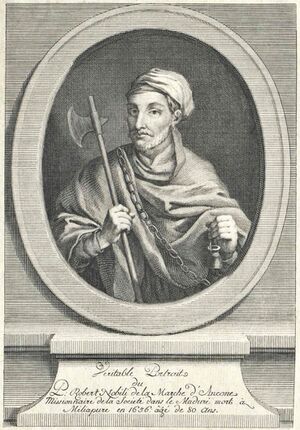Roberto de Nobili
இந்தப் பக்கத்தை தமிழில் வாசிக்க: ராபர்டோ டி நொபிலி
Roberto de Nobili (September 1577 - January 16, 1656) was a Jesuit missionary who was also known as Thathuva Bodhagar or Thathuva Bodhaga Swamigal (Philosophical Master). He considered it important for an evangelist to adapt to the local language and culture and was a pioneer in practicing the same. Roberto de Nobili lived like a Tamil sage and has written 40 books in prose. He marked the beginning of the Tamil Christian Literary tradition.
Birth, Youth
Roberto de Nobili was born in Montepulciano, in Tuscany, Italy in September 1577. His father was Count Pier Francesco Nobili who served as an officer in the Papal Army. His mother was Clarice Cioli.
Spiritual Life
Roberto joined the Jesuit Order in 1597 and in 1603, he started out from Lisbon as a missionary and reached Goa, India. Until then European missionaries were evangelizing only in coastal areas protected by the Portuguese navy. In 1606, having been sent to Tamil Nadu, he came to Madurai and met Gonzalo Fernandez, who was already in mission in the region. At that time, those who converted to Christianity were given Portuguese names and were asked to follow their customs regarding dressing and eating. So they came to be branded as Parangiand considered outsiders.[1]
Nobili did not believe in such divisions and held that the methods of Matteo Ricci, the missionary in China were right. Therefore, he adapted the lifestyle of Indian sages in food and clothing. He called himself Thathuva Bothagar meaning Philosophical teacher. He wore saffron clothing and a sacred thread, which led to him being called an Italian Brahmin.
He learnt Sanskrit and Tamil and studied the important works in both the languages. He was also well trained in Telugu. He believed that only by understanding and learning the local language and cultural aspects can one preach effectively. He believed this would ensure that Christianity did not feel alien. From 1607 he converted many, including Brahmins, into Christianity. He permitted them to keep their sacred thread and tuft even after conversion.
Nobili’s methods were opposed by fellow Jesuits and condemned by the bishop of Goa, Cristóvão. The issue was taken up with Pope Gregory XV. On January. 31, 1623 he wrote an Apostolic Letter titled "Romanae Sedis Antistes" in which the Pope declared that there were no issues in following such practices as long as they were not blindly reflecting other religions.
After this Nobili started the Madurai Mission officially and traveled to southern Tamilnadu and Srilanka to spread the faith.
Contribution
Contribution to Tamil Literature
When the complaints against him were being investigated, he was under suspension and during this time he wrote many books in Tamil prose. Gnanopathesam (Catechism) was written during this period. He brought in many Tamil words into liturgy such as Kovil (Church building), Arul (Grace), Prasadham (Offering), Guru (Priest), Vedham (Scripture), Poosai (Mass) which are still being used.
It is said that he has written 40 prose books in Tamil. For this reason he is considered a pioneer in Tamil prose and Tamil literary history. Following him, many European priests like Veeramamunivar (Constantine Joseph Beschi) contributed to Tamil literature. Though Nobili had written several Tamil books, Veeramamunivar is considered the reformer of Tamil prose.
Death
Roberto de Nobili passed away in Mylapore, Chennai on January 16, 1656.
Controversies
Roberto de Nobili preached that there were five Vedas in Hinduism and the fifth Veda of Jesus was suppressed by the Brahmins. He created a book on his own and took the 'ancient’ manuscript to Europe. Famous French thinkers such as Voltaire have praised the book as monumental and a revelation of hidden wisdom. For about a century this deceit was kept alive and popular. In 1774 Frenchresearcher Pierre Sonnerat came to India with the manuscripts and did extensive research and found that it was an apparent hoax. He exposed it by continuously writing about it with strong evidence. The manuscript is now exhibited in a museum in Paris.[2]
Works
Roberto de Nobili is said to have written 40 prose texts and 3 poetry texts in Tamil. Some of his books are:
- Gnanopathesa Kandam
- Manthira Malai
- Athma Nirnayam
- Thathuva Kannaadi
- Sesunathar Sarithiram
- Gnana Deepikai
- Neethi Sol
- Punar Jenma Akshepam
- Thooshana Thikkaram
- Nithya Jeevana Sallabam
- Kadavul Nirnayam
- Arch Devamatha Sarithiram
- Gnanopathesa Kurippidam
- Gnanopathesam
In Sanskrit he has written eight books and one of them was named Yesu Geethai (Gita of Jesus). In Telugu he has written four books.
External Links
- https://archive.org/details/dli.jZY9lup2kZl6TuXGlZQdjZQ1l0py
- https://archive.org/details/de-nobili-1607-preaching-wisdom-to-the-wise-three-treat/mode/2up
Footnotes
✅Finalised Page

